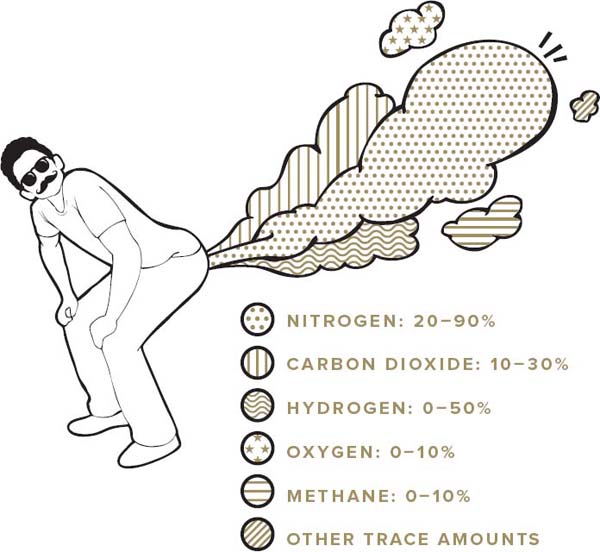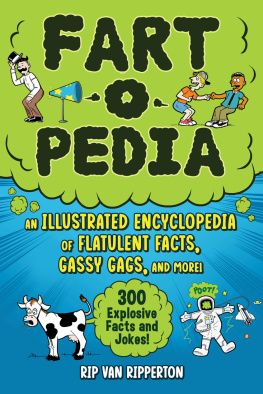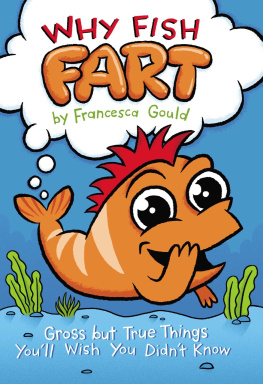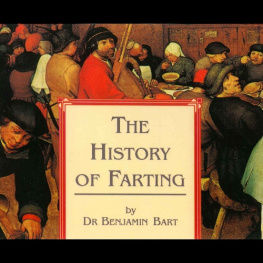The
Fart
TOOTORIAL
Written by
BEN APPLEBAUM & DAN DISORBO
Illustrations by Dan DiSorbo

I fart, therefore, I am.
Text copyright 2013 by Ben Applebaum and Dan DiSorbo
Illustrations copyright 2013 by Dan DiSorbo.
All rights reserved. No part of this book may be reproduced in any form without written permission from the publisher.
Library of Congress Cataloging-in-Publication Data
ISBN 978-1-4521-2421-6
Design by Real Art Design Group
Chronicle Books LLC
680 Second Street
San Francisco, California 94107
www.chroniclebooks.com
Contents

Introduction
In this world, we know but one thing to be true: you fart.
But do you know the facts behind your farts? You might know they stink and make silly sounds, but do you really know why and how? Do you know what kind of farts you made today? Do you know what to do with them once they are released into the wild? Ultimately, do you know why mastering your toot is such a worthy pursuit?
Well, now you will.
Although society reacts with intolerance toward farts (particularly someone elses), theres absolutely nothing wrong, embarrassing, or inappropriate about them.
Farting is part of the human experience. In fact, farting knows no borders; every person from every corner of the globefrom Angelina Jolie to Prince William to your high school math teacherfarts (though hopefully not at the same time). However, until we have a true understanding of what farts are and why we make them, and an appreciation for their characteristics, nuances, and various types, the human race will forever be doomed to the collective darkness of fart denial.
This ignorance is going to change, starting now. The Fart Tootorial will clear the air on breaking wind. It will guide you on a personal quest toward knowledge and self-betterment. It will arm you with the skills to clear a room, win the blame game, and, with the proper equipment, light your fart on fire. It will teach and inspire you to become cultivated in cutting cheese, philosophical about flatulence, and just plain smart about the fart. In short, it will make you a master blaster.
Its time to let the tootelage begin.
Gas is now in session.
You dont have to be smart to laugh at farts,
but you have to be stupid not to.
LOUIS C.K.
Chapter One
Getting Farted
THE FUNDAMENTALS OF
FLOATED BISCUITS
What exactly is a fart? How is it made? Why dont we talk about them more often? Who smelt it? And who exactly dealt it? Why are they so funny? These questions have plagued humankind for centuries. But not to worry, the answers found on the following pages should provide a solid foundation for your gas masterya liberal farts education, if you will.
What Is a Fart?
In literal terms, a fart is a mixture of gases that are by-products of the digestive process, which are expelled through the rectum. (Leave it to science to make farts boring.)
In more metaphorical terms, a fart is a remarkable explosion of gas thats also an explosion of emotion, culture, biology, and even history. A fart is a reminder of both our animal biology and the interconnection of our social selves. In other words, farts connect the people of the world.
Even before mankind existed, farts persisted. Early primates and even earlier dinosaurs farted. Some scientists actually believe dinosaur farts may have caused the global warming that led to their extinction. And before life itself ever existed, farts were there. The Big Bang can be regarded as the universes original fart.
But were not here to speculate; were here to educate you on farts, and more specifically, on your own farts. Homo sapiens have farted their way through history since before we even knew we had a history. And although female Homo sapiens have denied it, they, too, have farted. Today, millions of years later, all humans, from the moment theyre born, continue to fart on a daily basis. Its the circle of life.
Thats what a fart is.
Why Is a Fart Called a Fart?
Fart is more than just a vulgar four-letter word that starts with F. The word fart is both a noun and a verb and, believe it or not, is one of the oldest words in the English vocabulary. The root of this toot can be traced back to around A.D. 500 with the Old High German word ferzan . Similar words are also found in Old Norse, Slavic, Greek, and even Sanskrit.
The medical term for this magical mixture of gas is flatus and the act is technically called flatulence. But we believe in the word fart as much as we believe in the act itself. Its older, shorter, and practically onomatopoetic (it sounds like the thing its describing). So, from this page on, we will be putting our focus solely on farts and leave flatulence to the ivory towers.
Would a fart by any other name smell so stank? We think not.
Fart  Fact
Fact
Humans fart, on average, ten to fourteen times a day (and night). This results in about 2.5 pints or 40 ounces of actual gas (and gives new meaning to the song 40oz. to Freedom).
What Is in a Fart?
Unseen by the naked eye, farts are about one-half cup of a gas cocktail, mixed fresh by the bartender in your belly. Farts have an average temperature of 98.6 degrees (typically the same temperature as the farter) and are comprised of common gases like nitrogen, carbon dioxide, hydrogen, oxygen, and occasionally methane. After that, its a lineup of stink suspects: sulphur, hydrogen sulfide, methanethiol, dimethyl sulfide, skatole, ammonia, and indole.

BLOWING IN THE WIND
Passing gas is necessary to well-being.
HIPPOCRATES, THE FATHER OF WESTERN MEDICINE
The combined relative proportions of these gases depend on: what you ate, how much air you swallowed, what kinds of bacteria you have in your intestines, and how long you hold in the fart.
Fart  Fact
Fact
Though its likely full of hot air, theres some (dubious) evidence that ancient Romans believed in Crepitus, the god of farts and all things gassy. Not to be outdone, ancient Greeks were known to compare the sound of thunder to that of celestial flatulencepretty awesome, even gods fart.
Why Do We Fart?
Farting is a fact of lifeeven Mrs. Garrett, Jo, Blair, and Tootie fart. (How else did she get that name?) Farting is your bodys way of getting rid of unwanted gas from your colon, unwanted pressure from your intestines, and unwanted people from your general area. If you are a healthy human being, farting is as much a part of your everyday life as eating and breathing. In fact, eating and breathing are the main gas generators.
1. EATING
The breakdown of undigested food
When your body does not digest certain carbohydrates, bacteria in the large intestine consume the food and produce gas in the process. (Thus, in some sense, you dont create these farts, the little organisms inside you do.)
Fart 










 Fact
Fact